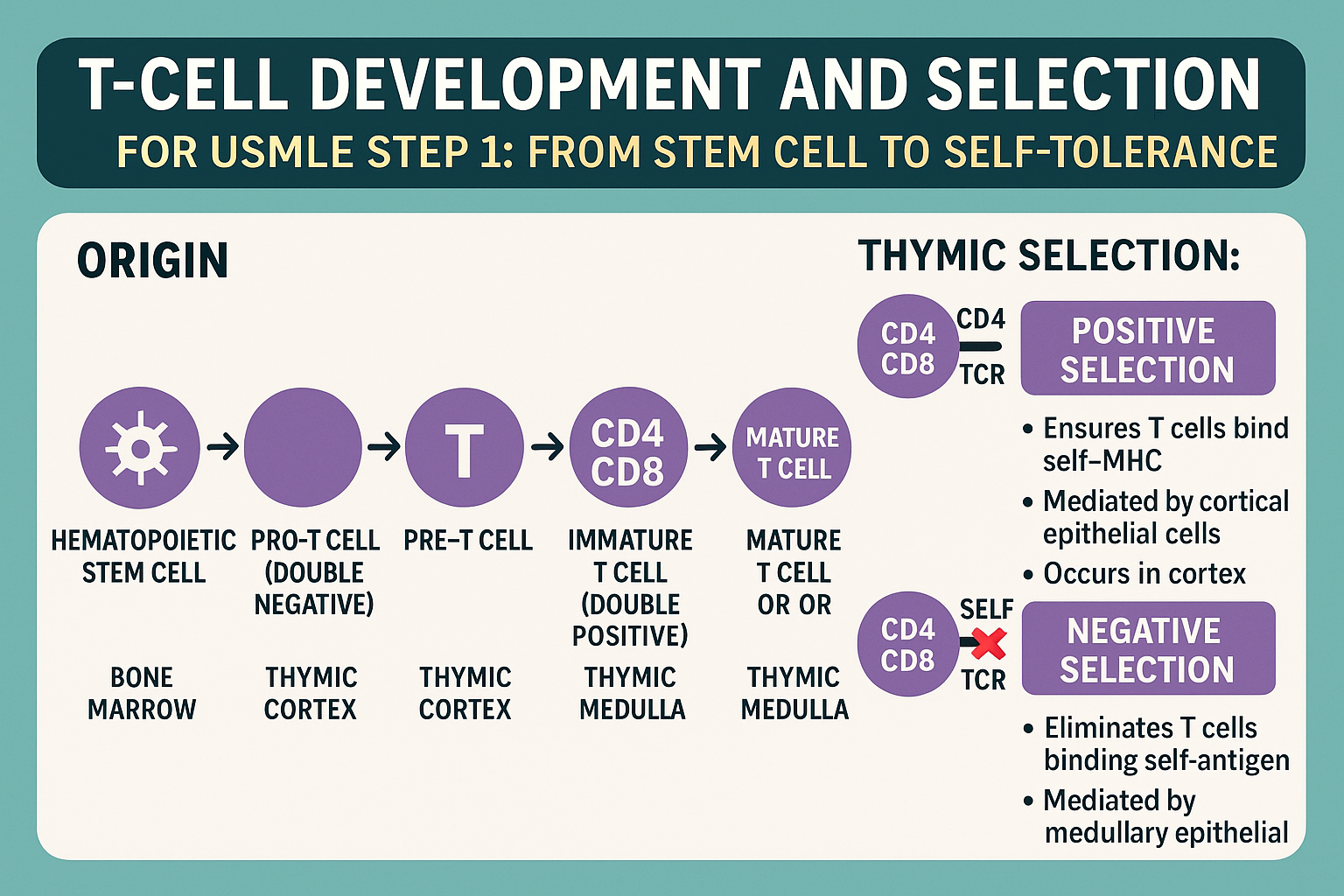🧠 T-Cell Development and Selection for USMLE Step 1: From Stem Cell to Self-Tolerance
T cells are the cornerstone of adaptive immunity, with roles ranging from pathogen elimination to immune regulation. For Step 1, you’ll be tested on:
Their developmental journey
The thymic selection process
Key surface markers and immunodeficiencies
Understanding how T cells acquire MHC restriction and self-tolerance is essential for immunology mastery.
🧬 Origin: From Bone Marrow to Thymus
T-cell precursors (pro-T cells) are produced in the bone marrow but must migrate to the thymus for maturation.
| Stage | Location | Key Features |
|---|---|---|
| Hematopoietic stem cell | Bone marrow | Multipotent, gives rise to lymphoid line |
| Pro-T cell (double negative) | Thymic cortex | Lacks CD4 and CD8 |
| Pre-T cell | Thymic cortex | Begins TCR gene rearrangement |
| Immature T cell | Thymic cortex | Expresses both CD4 and CD8 (double positive) |
| Mature T cell | Thymic medulla | Expresses either CD4 or CD8 |
🎯 Thymic Selection: Positive and Negative
The thymus performs two critical tests:
✅ Positive Selection (Cortex)
Goal: Ensure TCR can recognize self-MHC
T cells that bind self-MHC I or II with appropriate affinity survive
Occurs in thymic cortex
Mediated by cortical epithelial cells
🧠 Outcome: T cells become MHC-restricted
❌ Negative Selection (Medulla)
Goal: Eliminate T cells that bind self-antigens too strongly
Occurs in thymic medulla
Mediated by medullary epithelial + dendritic cells
Involves AIRE gene to express peripheral antigens
🧠 Outcome: T cells become self-tolerant
🔁 CD4 vs CD8 Lineage Commitment
After passing selection:
| MHC Binding | Final T Cell Type |
|---|---|
| Binds MHC II | CD4⁺ helper T cell |
| Binds MHC I | CD8⁺ cytotoxic T cell |
Step 1 often presents clinical vignettes testing this distinction!
🧪 High-Yield Step 1 Connections
🔬 Immunodeficiencies
| Disorder | Mechanism | Step 1 Clue |
|---|---|---|
| DiGeorge syndrome | Absent thymus | ↓ T cells, viral/fungal infections |
| SCID | T- and B-cell failure | No thymic shadow, opportunistic infections |
| AIRE mutation (APS-1) | Failed negative selection | Autoimmune endocrinopathies |
🧠 Mnemonics
“MHC Restriction is POSITIVE” → Positive selection ensures MHC recognition
“Autoimmunity is NEGATIVE” → Negative selection prevents it
“T-cells are Taught in the Thymus”
🧪 Step 1 Sample Question
A 4-year-old boy presents with chronic viral infections and absence of a thymic shadow on CXR. What process has failed?
A) Positive selection
B) T-cell receptor rearrangement
C) Negative selection
D) B-cell somatic hypermutation
✅ Answer: A — Without a thymus, positive selection cannot occur.
📘 Final Words
T-cell maturation is fundamental to immunology and frequently tested on USMLE Step 1.
Don’t just memorize the surface markers — understand the sequence, location, and logic behind each step.
🧠 Master It with KOTC
Unlock visuals like this, plus daily quizzes, adaptive questions, and gamified review:
🔗 kingofthecurve.org/trial-sessions
🔗 kingofthecurve.org/free-lifetime
Frequently Asked Questions (FAQs)
-
Aim for 4-6 focused hours, ensuring you incorporate breaks to avoid burnout.
-
Practice mindfulness techniques, take practice exams under realistic conditions, and maintain a balanced lifestyle.
-
Set short-term goals, seek support from mentors, and reward yourself for small achievements.
-
Regular exercise improves focus, reduces stress, and enhances overall mental clarity.
-
KOTC offers personalized learning tools, gamification features, and adaptive question banks to help students stay on track without burnout.


